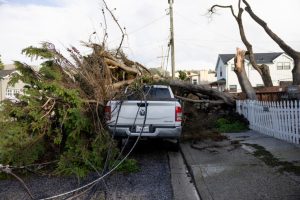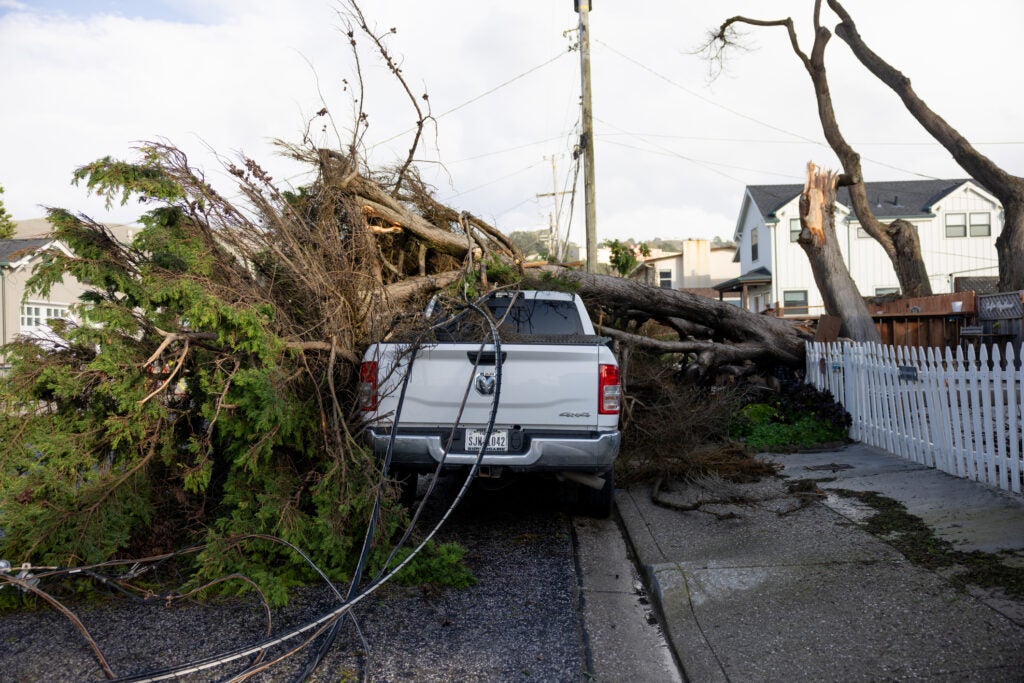Key takeaways
- Acts of God are natural events or acts of nature that usually can not be predicted or controlled.
- Car insurance covers acts of nature through comprehensive coverage.
- Accidents caused by sliding on ice, wind or hydroplaning are not considered acts of God.
Imagine it’s a dark and stormy night. Lightning hits the tree next to your driveway, causing it to fall and crush your car. Was it bad luck? Or something more divine? The insurance industry calls these types of events “acts of God” or “force majeure.” While these terms may sound dramatic, these are simply unexpected and uncontrollable natural events, such as lightning strikes, earthquakes and floods. Acts of God are usually covered by car insurance, as long as you have the right coverage in place.
Does car insurance cover acts of God?
Most losses that fall under the insurance definition of acts of God are covered by comprehensive coverage. Car insurance companies determine which coverage pays for a covered claim based on the initial cause of loss. For example, if heavy rains cause flooding and your car is damaged, your insurance company could help cover the repair or replacement costs if your policy has comprehensive coverage.
What does an act of God include?
Acts of God are also called acts of nature and are unpreventable and sudden natural events. While extreme weather can be predictable, the impact it has on a parked car can be fairly unpreventable. In homeowners insurance, acts of God are often excluded from policies and may require an endorsement or purchase of an additional policy for financial protection. However, comprehensive coverage is available for auto policies, which covers damage to your vehicle from an event other than a collision.
Events that are usually considered acts of God and are covered by comprehensive coverage may include:
- Earthquakes
- Floods
- Hail
- Hurricanes
- Ice
- Landslides
- Lightning strikes
- Mudslides/mudflows
- Sinkholes
- Sleet
- Snow
- Tsunamis
- Volcanic eruptions
- Wildfires
- Windstorms
What is not considered an act of God?
For the most part, acts of God events don’t involve human action. While some accidents may feel out of your control, insurance carriers usually don’t view them as acts of God. For example:
- Skidding on black ice
- Swerving to avoid colliding with another vehicle
- Hitting a deer
Just because something is not considered an act of God doesn’t mean it won’t be covered by insurance. While hitting a deer is not considered an act of God, it is still covered by comprehensive insurance.
It’s your responsibility as a driver to maintain control of your vehicle at all times, even during extreme weather events. Accidents that occur while the car is in motion are usually considered collisions and may be covered by collision insurance if it is a part of your policy.
Both comprehensive and collision coverage are optional and can be purchased together for full coverage or separately.
How to file an insurance claim for an act of God loss
Filing a claim for an act of God loss is similar to filing any other type of auto claim. In fact, it may be easier since it usually doesn’t involve a third party. Many carriers offer the option to file claims online or via the carrier app, or you can contact a claims agent directly. The claims process may vary slightly, but generally involves:
- Document the loss
- Contact your auto insurance company to file the claim
- Ask your claims agent if you are covered, what your insurance deductible is and if you have rental reimbursement coverage
- Schedule your repairs
- Once the repairs are complete, pay the deductible and collect your car
In a situation where your vehicle is deemed a total loss, your insurance adjuster will issue a claims check for the actual cash value of the vehicle, minus the deductible.
Frequently asked questions
-
The legal definition of an act of God varies. According to the Legal Information Institute at Cornell Law School, common law defines an act of God as “an overwhelming event caused exclusively by natural forces whose effects could not possibly be prevented.” The modern definition broadens to include “all natural phenomena whose effects could not be prevented by the exercise of reasonable care and foresight.”
-
A tree falling may be considered an act of God, but it depends on the reason it happened. If it fell for reasons beyond human control, like strong winds knocking it over, it may be considered an act of God. However, if your neighbor is cutting down a tree and it lands on your vehicle or property and causes damage, it would not be considered an act of God.
-
If your property has been impacted by an act of God, one of the best ways to prove it is to provide evidence of how the damage occurred. For example, if the damage to your vehicle was caused by debris that was picked up by high winds, you could provide information from weather forecasts and pictures of the damage that occurred. If possible, photos of the debris, whether from a splintered tree or something else, may also be helpful to prove the damages were caused by an act of God.
Read the full article here

